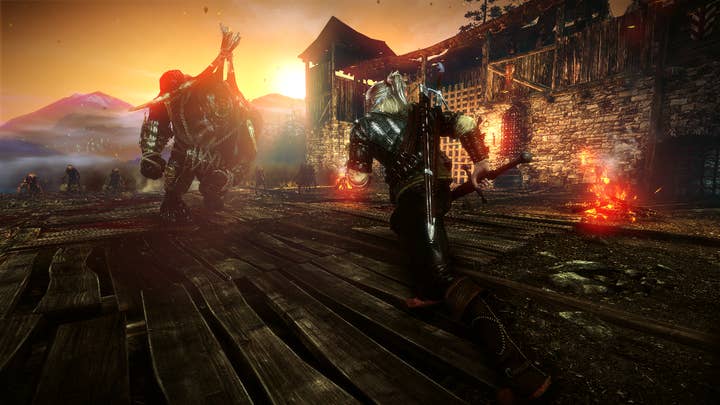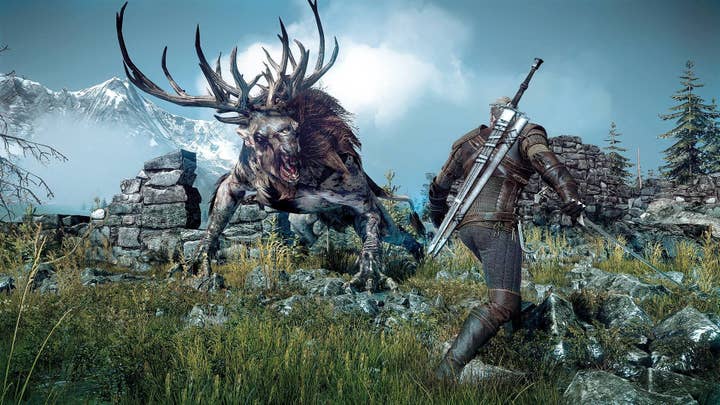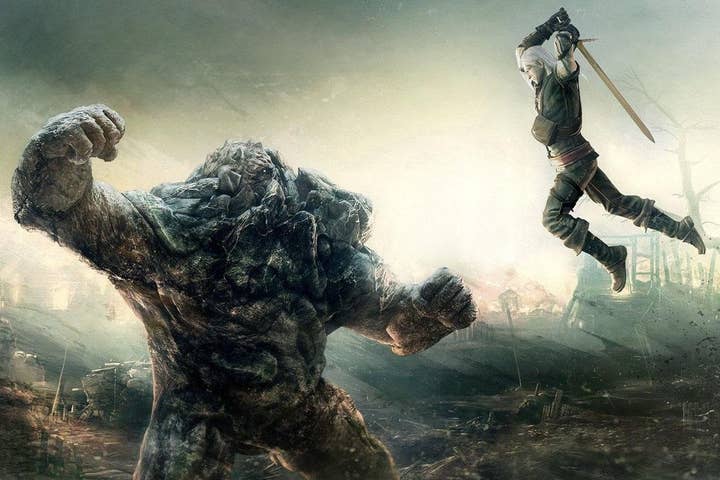CD Projekt Red: Selling The Witcher 3
CEO Marcin Iwiński on the importance of maintaining control of your audience and your message
Like all principled companies, whenever CD Projekt Red prepares to address a crowd there are certain expectations around what it might say. It could be the politics of DRM, the PC's defiance of its own forecasted demise, the importance of mature themes and strong characters in storytelling. This Warsaw-based studio - responsible for both The Witcher franchise and the proudly uncomplicated online retailer GOG.com - has never been shy about stating its beliefs, or allowing them to manifest in its products and services.
But the talk delivered by co-founder and CEO Marcin Iwiński at Digital Dragons does not dwell on the topics mentioned above, or any others that one might immediately associate with CD Projekt. Instead, Iwiński chose to give the assembled crowd - largely composed of independent Polish developers - a crash-course in marketing and promoting their own games. The tools to create games are more accessible now than ever before, Iwiński tells me when we meet after the talk, but that very fact makes these skills more important than ever. Despite the increase in creative freedom and market access, too many developers feel intimidated by the task of nurturing their audience and selling their vision.
"At a certain point if you want to have it done well and grow your company, I really believe that you have to do it yourself"
"What we're saying is that developers should really factor in preparing assets and really talking about their games," Iwiński says. "You need to build a great game first, but then you need to get the message across. In the flood of information that exists right now, you need to stand out."
In truth, these concerns are playing on Iwiński's mind in general. With The Witcher 3: The Wild Hunt, CD Projekt is effectively self-publishing its biggest release to date, and orchestrating a simultaneous launch on PC, Xbox One and PlayStation 4. The studio has made good games before, of course, and its origins as a successful distribution business allowed it to retain far more control over their content and messaging than most studios on their initial projects. But The Witcher 3 still presents CD Projekt with a couple of daunting unprecedented challenges.
With The Witcher, a publisher was brought in to get the game finished and to reach a wide enough audience in an era still dominated by bricks-and-mortar retail. With The Witcher 2: Assassin's of Kings it signed co-publishing agreements to ensure it built on the original's success, and to assist with its first ever console launch. For The Witcher 3, however, CD Projekt is effectively going it alone, albeit with a handful of carefully chosen partners. The rewards could be great, but only equal to the risks involved.

"At a certain point if you want to have it done well and grow your company, I really believe that you have to do it yourself," Iwiński says. "It's the only way to go."
At the start of the presentation, Iwiński illustrates the company's ascent with pictures of The Witcher 2's E3 presence compared to that of its imminent sequel: from a single-screen buried at the rear corner of a cavernous hall, to a dedicated room with a snaking queue of journalists clamouring to take a look. Even as a casual observer, public anticipation for The Witcher 3 seems at a different pitch to that which greeted its forebears. According to Iwiński, it received 55 E3 awards from various publications last year; there is a sense that, with so few RPGs demonstrating the potential of the new generation of consoles, The Witcher 3 could not be better timed. Just think of how Bethesda's Oblivion caught the public imagination when it launched on Xbox 360. And before you mention it, Dragon Age: Inquisition will also be released on Xbox 360 and PlayStation 3, necessarily limiting the scale of its ambitions.
"We still have a lot to prove," Iwiński says, but there's no question about his confidence in the product. The new consoles have been "a joy" to work with compared to the trials of squeezing The Witcher 2 on to the Xbox 360, and that will show in the breadth and polish in the game. "I think the core audience on PC is more forgiving, so it's easier, but when you go to consoles you really have to try to make things perfect. They won't forgive that the buttons don't work as well as they used to, or that there's something clunky in the interface. And that's obviously tougher, but if you take that knowledge and apply it to PC and console as well, it makes the PC game better."
"We're well off financially. I don't want to ship games because I have to or I'll go out of business. That's a bad recipe"
Iwiński admits that, from CD Projekt's earliest days, there was always the nagging fear that they were just, "core gamers from Eastern Europe who can play games with very strange interfaces." Whether it could create a game that was truly popular in markets like the United States was all but impossible to predict, but The Witcher series has now sold 7 million units worldwide, with the second comfortably outselling the first. "We want to take that further," he says. That's a huge responsibility to entrust to another company, and CD Projekt's success to date has afforded it the freedom to invest more in The Witcher 3's success.
"We're well off financially," he says. "We don't need to do it for the money. Money, in business, is a barometer of whether you're doing things right or wrong. If you lose money 20 years in a row you're a charity, and that's a different thing. But we don't have to hit this revenue in that quarter or we'll die. The original founders are the controlling stakeholders. We have obligations to our investors that we treat very seriously, but I can always justify my decision.
"That's how I want to make games. I don't want to ship games because I have to or I'll go out of business. That's a bad recipe. Everyone has different goals, but this is just about us."
On the subject of how the company might respond to Oblivion-scale success Iwiński is more guarded. In its years as a distributor CD Projekt opened offices Hungary and the Czech Republic; both neighbouring countries, but an obstacle ultimately tackled simply because the company was flush with success. The subsequent closure of these outposts was, Iwiński says, "a vital experience" for the way he thinks about growth.
"They weren't really different cultures - it's not China. But we realised that, whenever we're not there, it's not really CD Projekt any more. It's a philosophical problem in a way."

The solution has been to hand-pick partners for distribution and logistics, but to bring all of the messaging and community outreach in-house. CD Projekt has small embedded teams of PR reps and advisers on the ground in Poland, Germany, Russia and the US; natives who understand the local gaming market and audience. Should The Witcher 3 prove to be a commercial success, that network will grow without compromising the internal culture of the company.
"You [have to] keep those people immersed in the culture of the company: they come over [to Warsaw], we meet, we talk. That is the best go-to-market solution."
"Only the developer can change their reality. They are the vision holders, they are the passion holders"
Iwiński has no intention of demonising publishers, but the context in which they operate has changed radically since the launch of its first game back in 2007. At that point it was all but impossible to release a game in multiple countries without a publisher - the demands of physical retail made sure of that. The Witcher 3 still requires some degree of logistical aid to reach its potential audience, but Iwiński knows that, for the new wave of Polish developers attending a conference like Digital Dragons, that won't be the case. The biggest challenge now is to make people see the worth of your game, and nobody is better equipped to do that than its creator.
"There are good publishers and there are bad publishers, but only the developer can change their reality. They are the vision holders, they are the passion holders. With a middle man, they tell your story and you lose, what, 50 per cent of that message. If you're doing it through a bigger company you might have two layers of those people.
"I want to demystify one thing, because a lot of people out there - including us, back in the day - are thinking, 'We'll take the publisher, co-publisher, agency' - the magical solution guys. It's bullshit. There's nothing like that, and you'll be very disappointed in nine out of ten cases. we were.
"You have to learn it, and then you can use external support when you know how it works. Because then you can judge what they're doing. You won't be buying their crap, or their lousy work, and you'll be able to make a more fruitful, useful and meaningful cooperation. Don't be like a sheep going out there: 'Do everything for me.' They don't understand your game. You're the passionate one. You're the creator.
"People should consider getting the message out there as part of the development process. You can develop a game and think it's the best in the world, but if that's it? You're going dead wrong."

